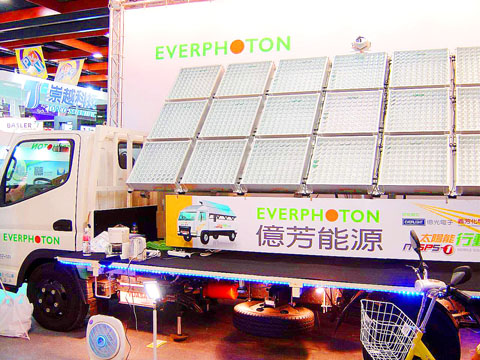The 2008 Taiwan International Photovoltaic Forum and Exhibition, aimed at promoting the solar industry, opened in Taipei yesterday.
This year’s exhibition is bigger than ever, with 155 exhibitors and 299 booths — up 109 percent and 172 percent respectively from last year — the Taiwan External Trade Development Council (TAITRA) said.
In his opening remarks yesterday, Deputy Minister of Economic Affairs Shih Yen-shiang (施顏祥) said that solar energy was a hot market, with statistics showing that the industry has been growing at a compound annual growth rate of 35 percent since 1998.

PHOTO: CHEN YUNG-CHI, TAIPEI TIMES
“Taiwan’s solar industry is well established, except for polysilicon at the very top of the stream ... Based on our successful experiences developing the semiconductor and thin-film-transistor liquid-crystal-display (TFT-LCD) industries, I believe Taiwan will become the most important solar manufacturing base in the world,” Shih said.
The total production value of Taiwan’s photovoltaic industry reached NT$53.5 billion (US$1.65 billion) last year and is projected to exceed NT$100 billion this year, Shih said, adding that the value should exceed NT$400 billion by 2015.
Taiwan has become the fourth-largest solar cell manufacturing country in the world, with a solar cell output of 545 megawatts-peak (MWp) last year, accounting for almost 13 percent of global production.
Taiwan Photovoltaic Industry Association chairman Lan Chung-wen (藍崇文) said that grid parity, the point at which photovoltaic electricity is the same price as grid electricity, might be achieved in 2012 or 2015, adding that this would boost industry growth.
In addition, Lan said the industry stood to benefit from the fact that one-fourth of the world’s population does not have access to electrical grids. It is estimated that the use of solar energy will grow sharply in less developed countries after 2012, Lan said, citing a European Photovoltaic Industry Association report.
The leading international companies participating in the two-day expo include Q-Cells AG, the world’s second-largest manufacturer of solar cells, based in Germany, E. I. du Pont de Nemours and Co from the US, and Nisshinbo Industries Inc from Japan.
Leading Taiwanese companies participating in the fair include E-Ton Solar Tech Co (益通光能), Gintech Energy Corp (昱晶能源) Green Energy Technology Inc (GET, 綠能科技) and many others.

Taiwan will prioritize the development of silicon photonics by taking advantage of its strength in the semiconductor industry to build another shield to protect the local economy, National Development Council (NDC) Minister Paul Liu (劉鏡清) said yesterday. Speaking at a meeting of the legislature’s Economics Committee, Liu said Taiwan already has the artificial intelligence (AI) industry as a shield, after the semiconductor industry, to safeguard the country, and is looking at new unique fields to build more economic shields. While Taiwan will further strengthen its existing shields, over the longer term, the country is determined to focus on such potential segments as

UNCERTAINTY: Innolux activated a stringent supply chain management mechanism, as it did during the COVID-19 pandemic, to ensure optimal inventory levels for customers Flat-panel display makers AUO Corp (友達) and Innolux Corp (群創) yesterday said that about 12 to 20 percent of their display business is at risk of potential US tariffs and that they would relocate production or shipment destinations to mitigate the levies’ effects. US tariffs would have a direct impact of US$200 million on AUO’s revenue, company chairman Paul Peng (彭雙浪) told reporters on the sidelines of the Touch Taiwan trade show in Taipei yesterday. That would make up about 12 percent of the company’s overall revenue. To cope with the tariff uncertainty, AUO plans to allocate its production to manufacturing facilities in

COLLABORATION: Given Taiwan’s key position in global supply chains, the US firm is discussing strategies with local partners and clients to deal with global uncertainties Advanced Micro Devices Inc (AMD) yesterday said it is meeting with local ecosystem partners, including Taiwan Semiconductor Manufacturing Co (TSMC, 台積電), to discuss strategies, including long-term manufacturing, to navigate uncertainties such as US tariffs, as Taiwan occupies an important position in global supply chains. AMD chief executive officer Lisa Su (蘇姿丰) told reporters that Taiwan is an important part of the chip designer’s ecosystem and she is discussing with partners and customers in Taiwan to forge strong collaborations on different areas during this critical period. AMD has just become the first artificial-intelligence (AI) server chip customer of TSMC to utilize its advanced

Chizuko Kimura has become the first female sushi chef in the world to win a Michelin star, fulfilling a promise she made to her dying husband to continue his legacy. The 54-year-old Japanese chef regained the Michelin star her late husband, Shunei Kimura, won three years ago for their Sushi Shunei restaurant in Paris. For Shunei Kimura, the star was a dream come true. However, the joy was short-lived. He died from cancer just three months later in June 2022. He was 65. The following year, the restaurant in the heart of Montmartre lost its star rating. Chizuko Kimura insisted that the new star is still down